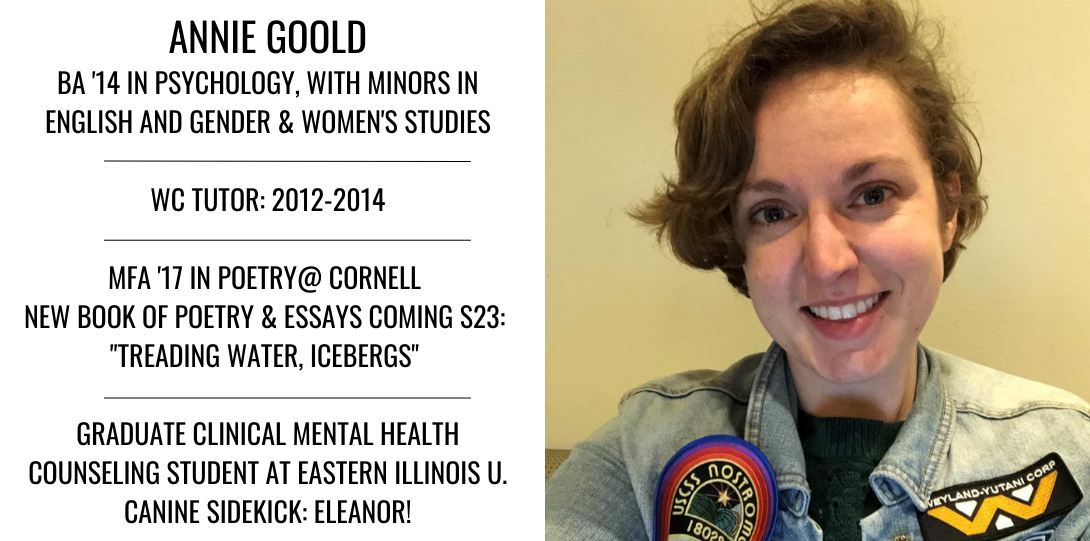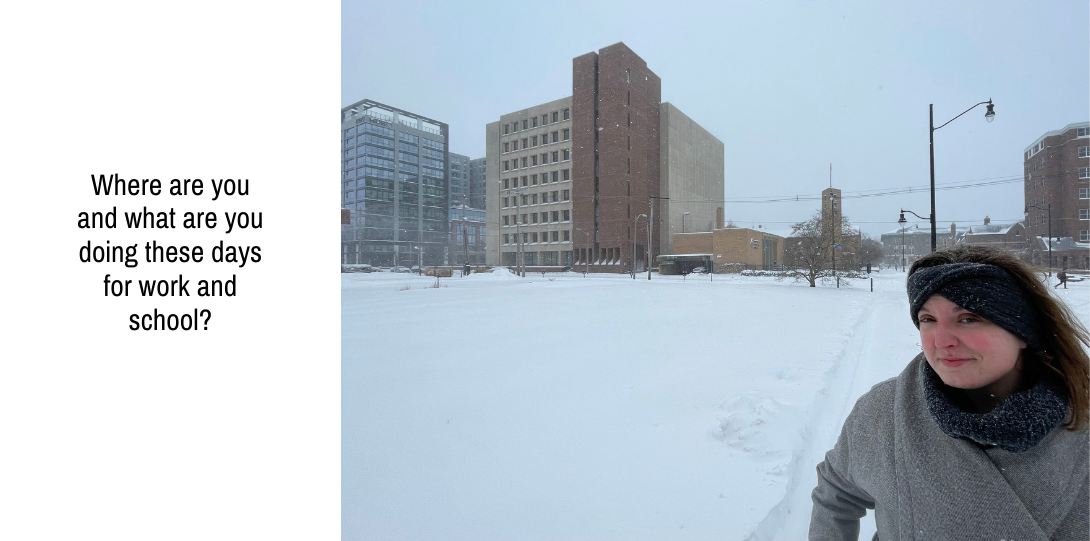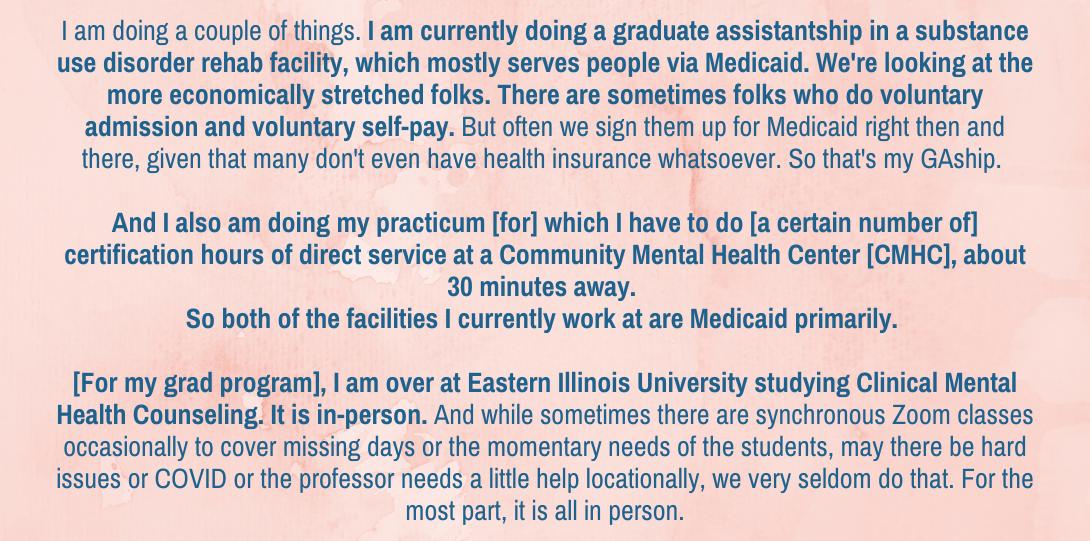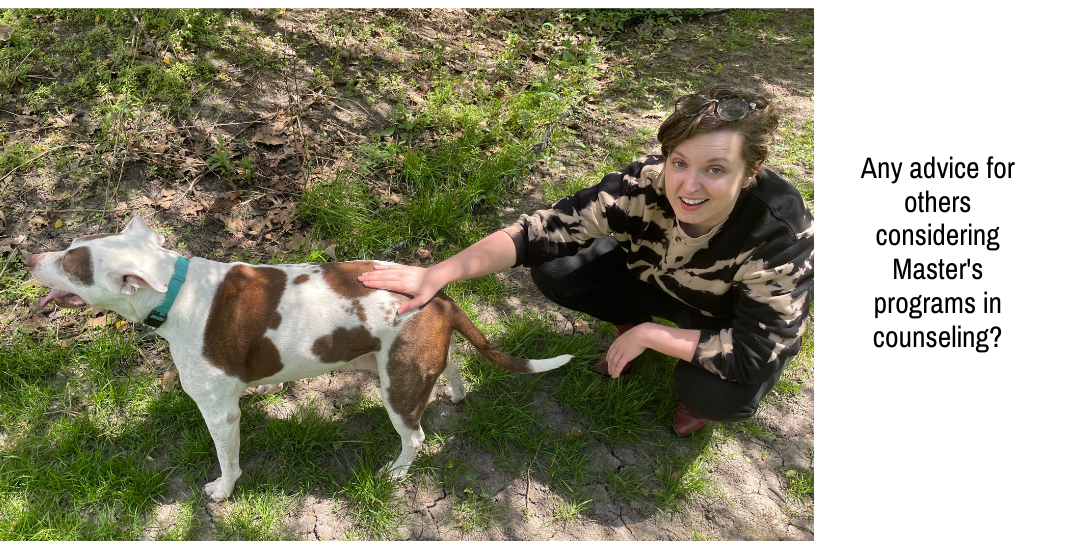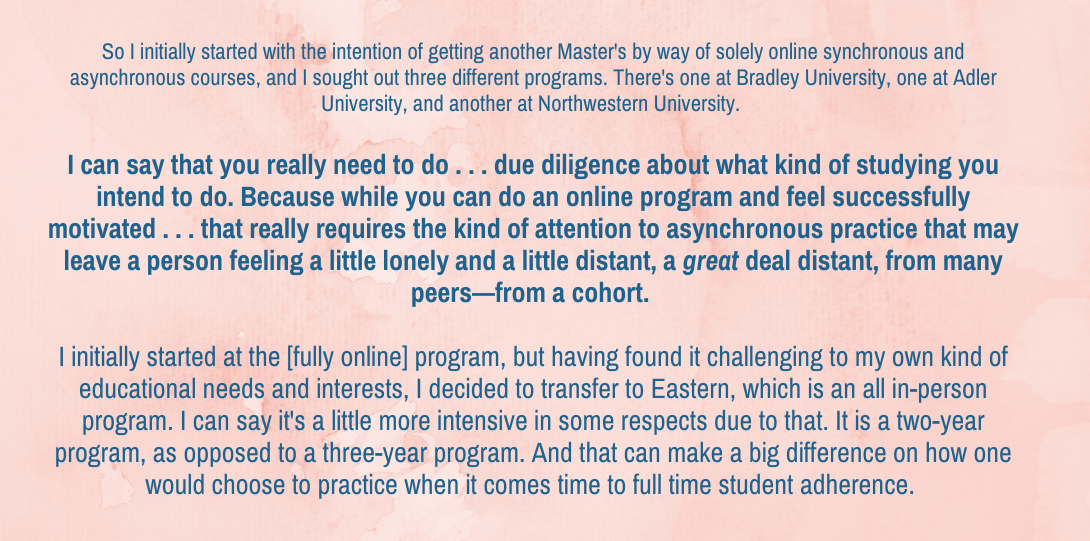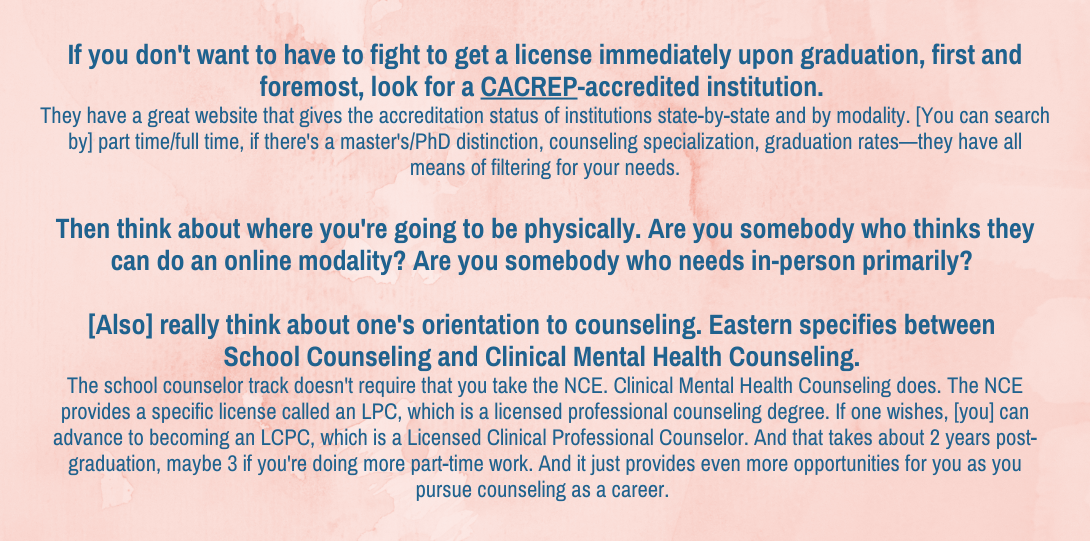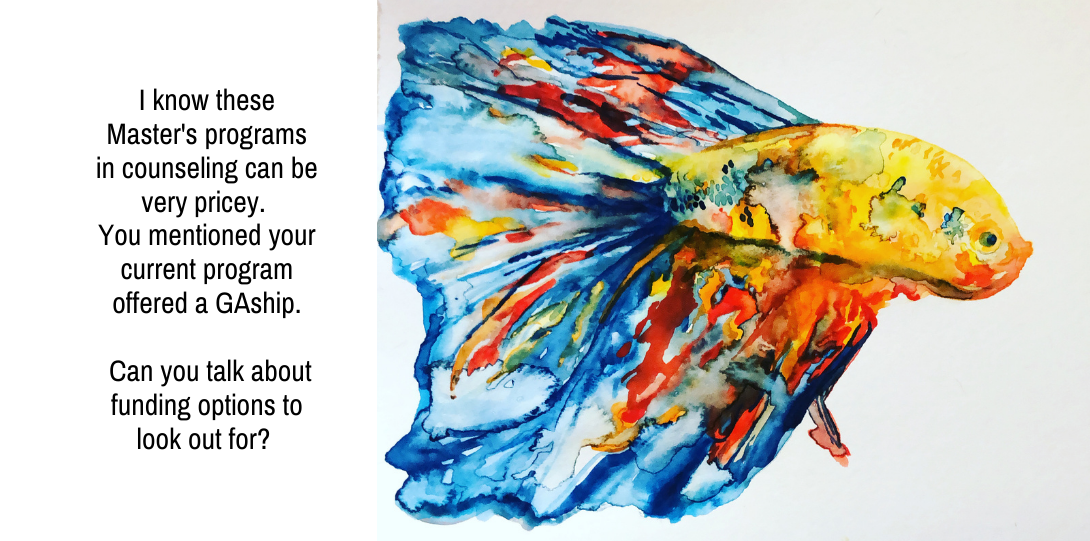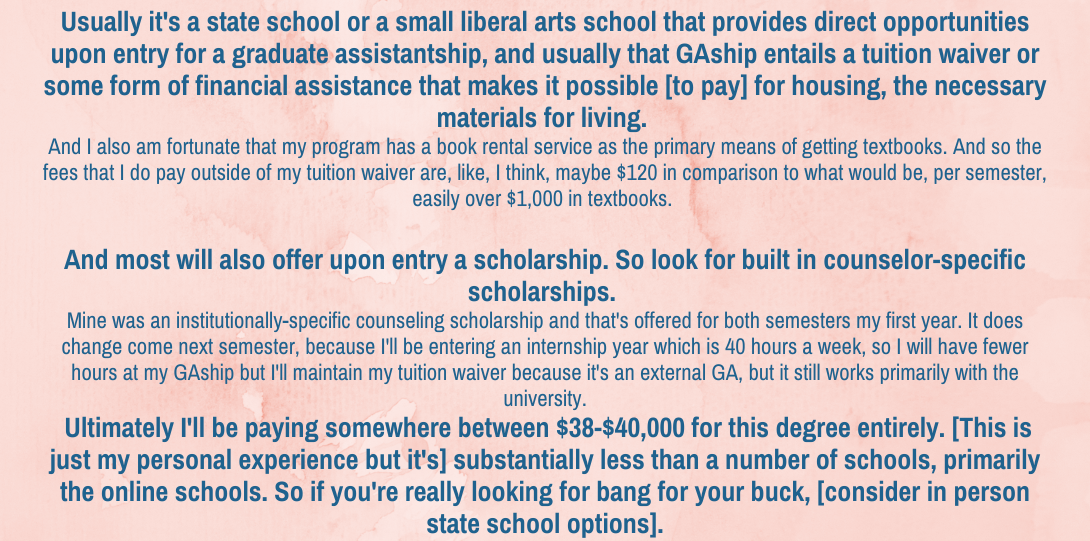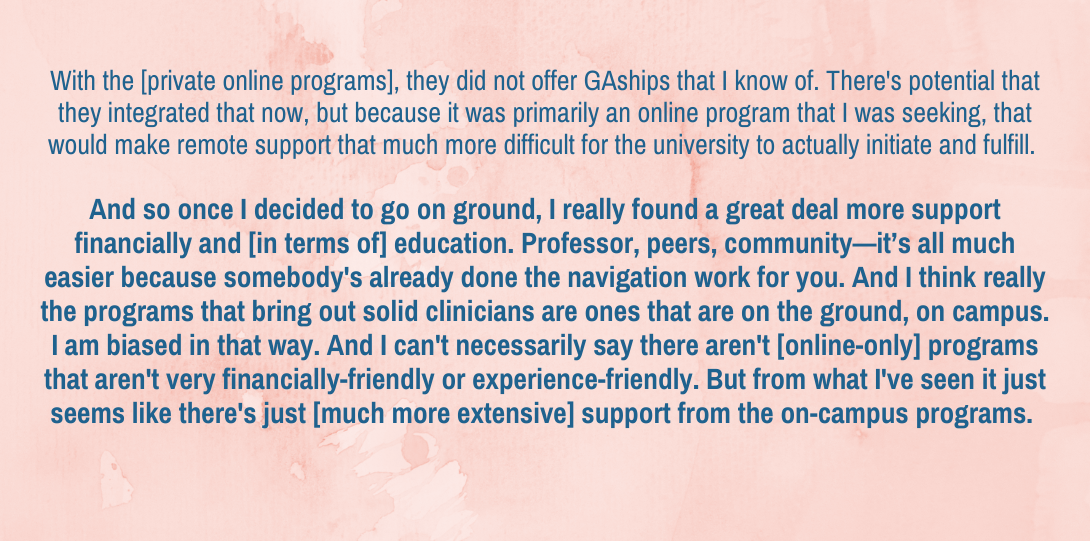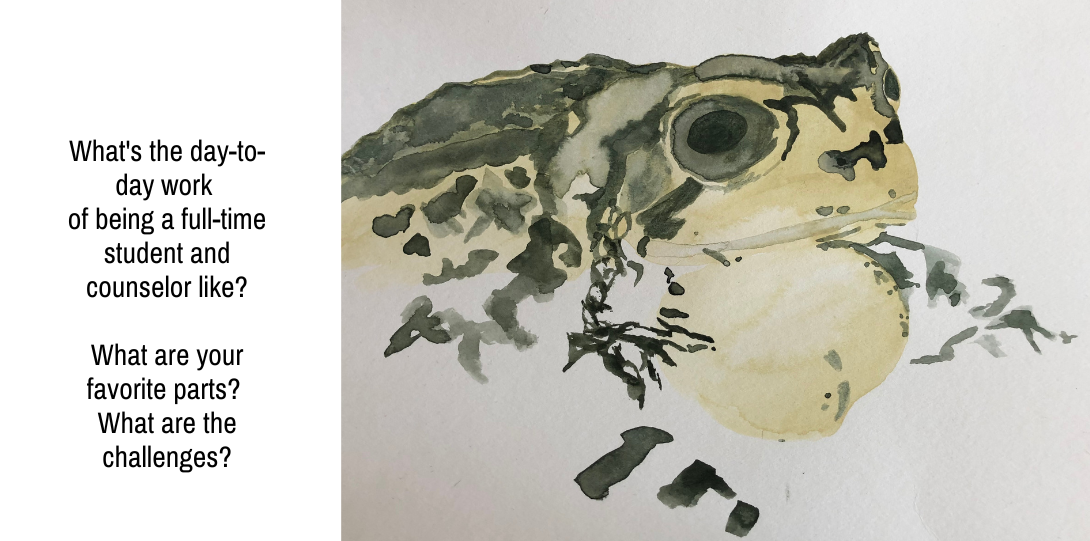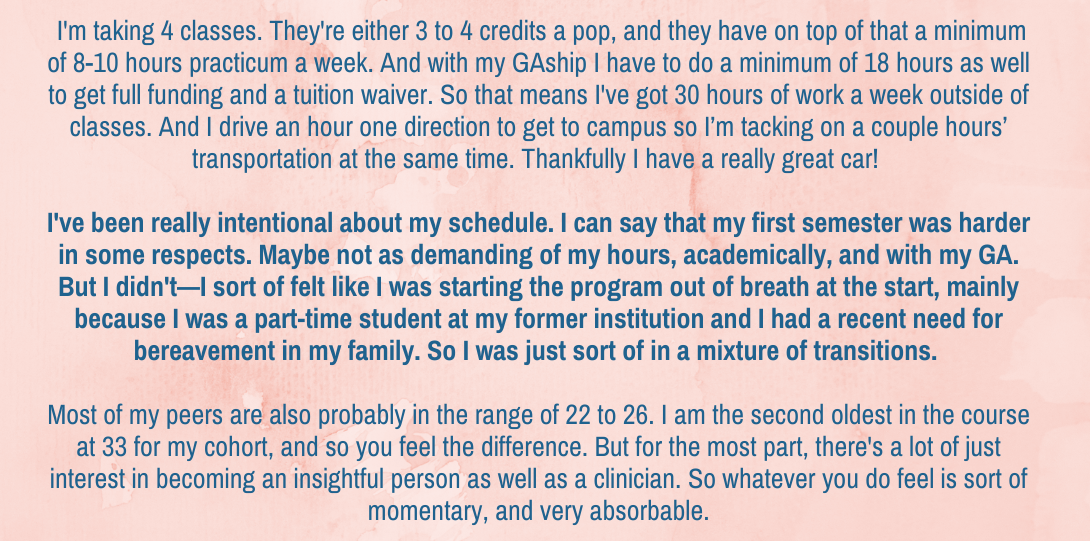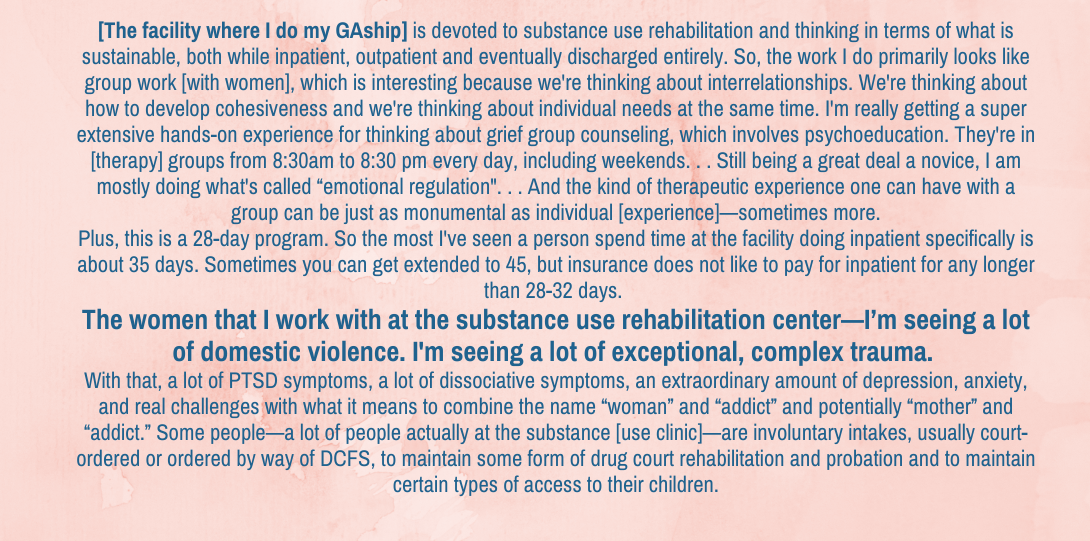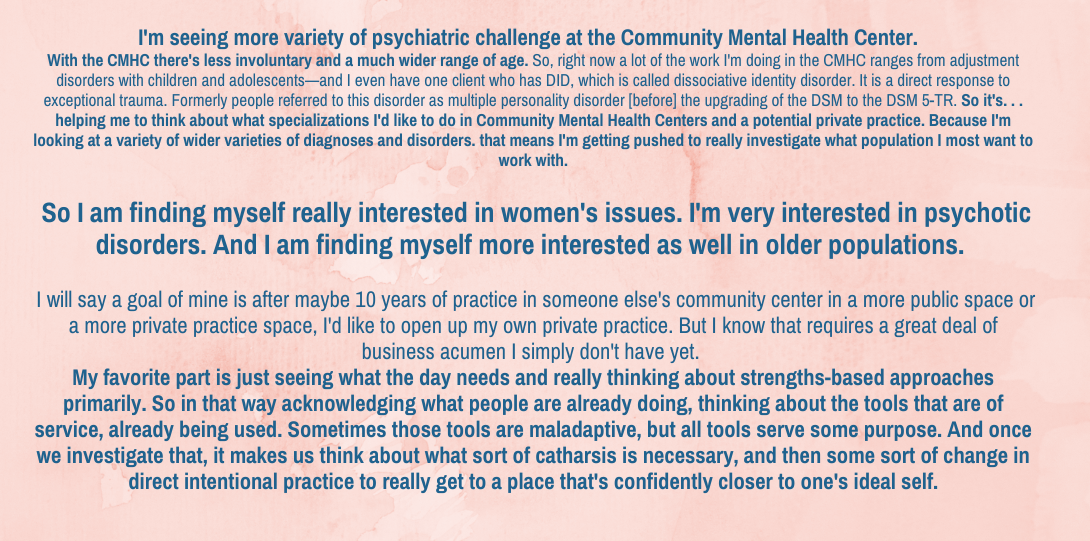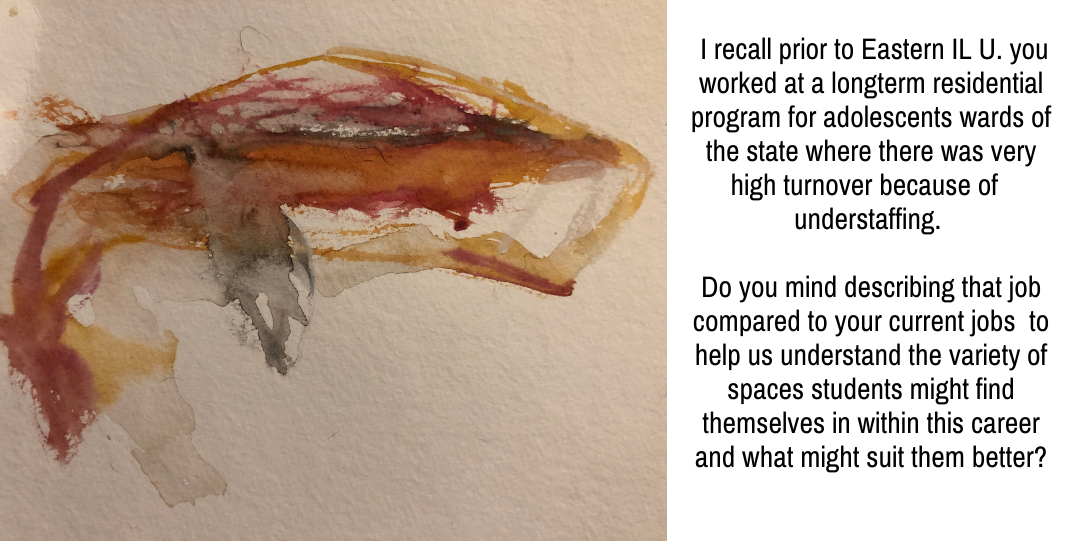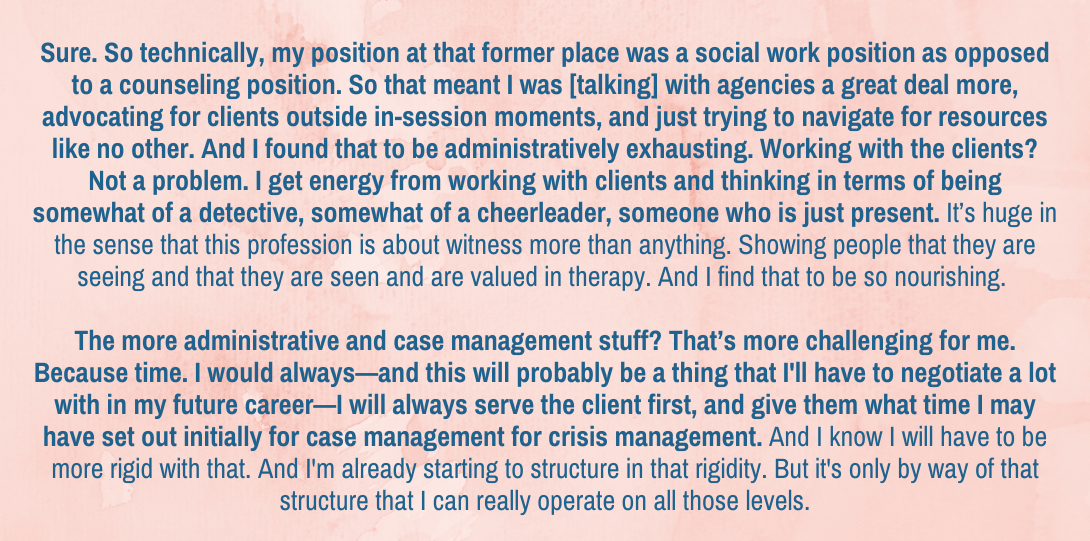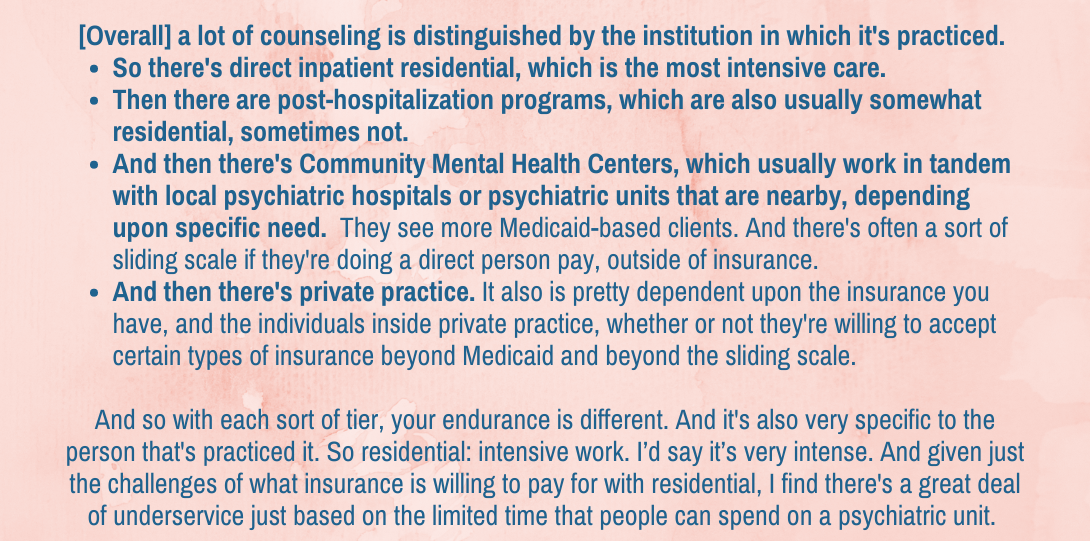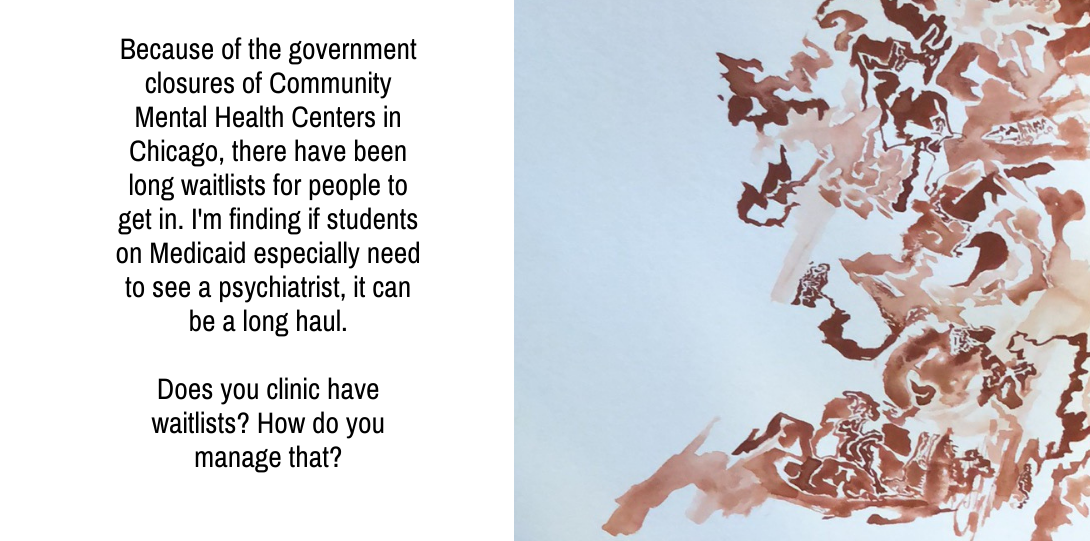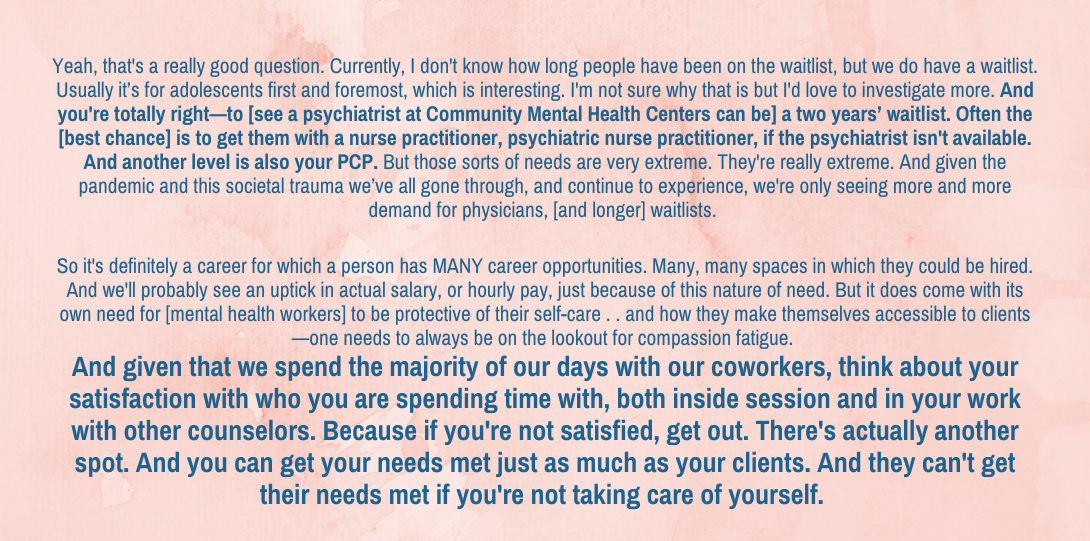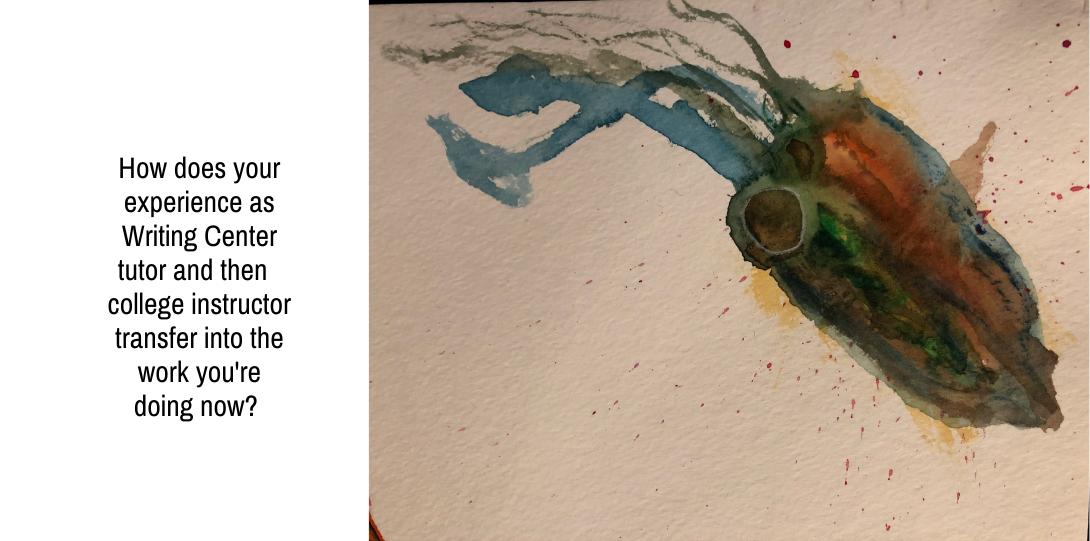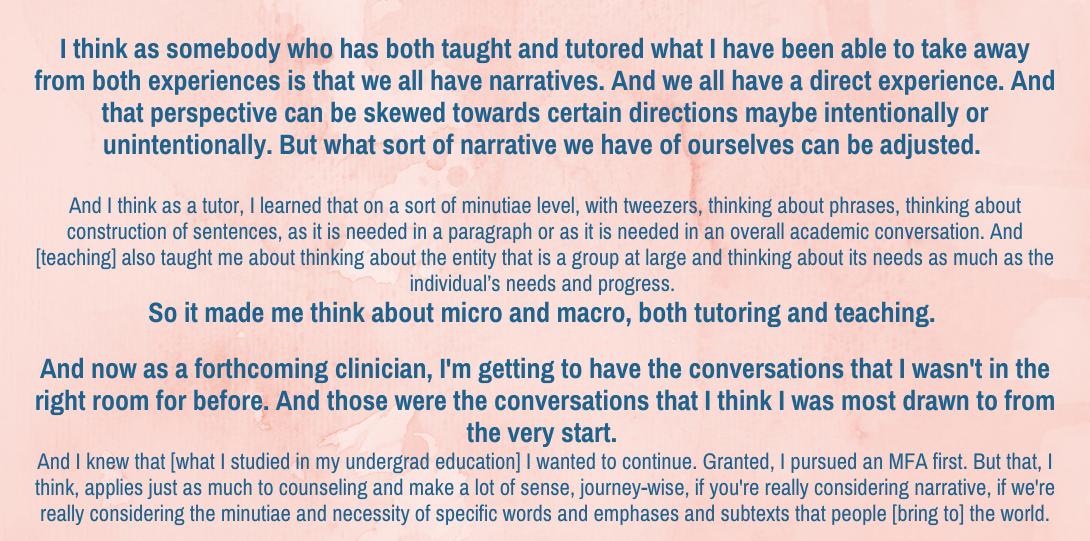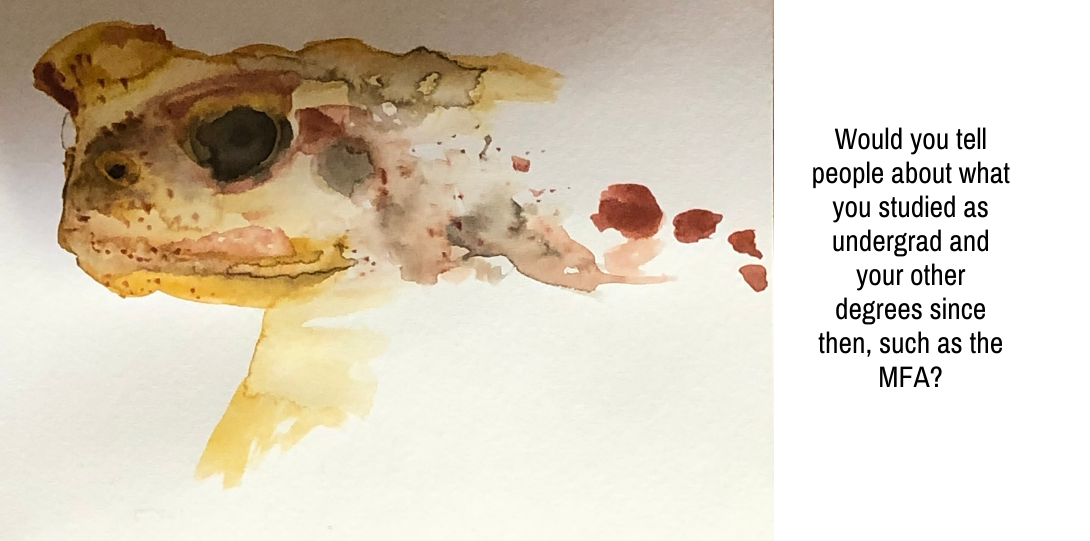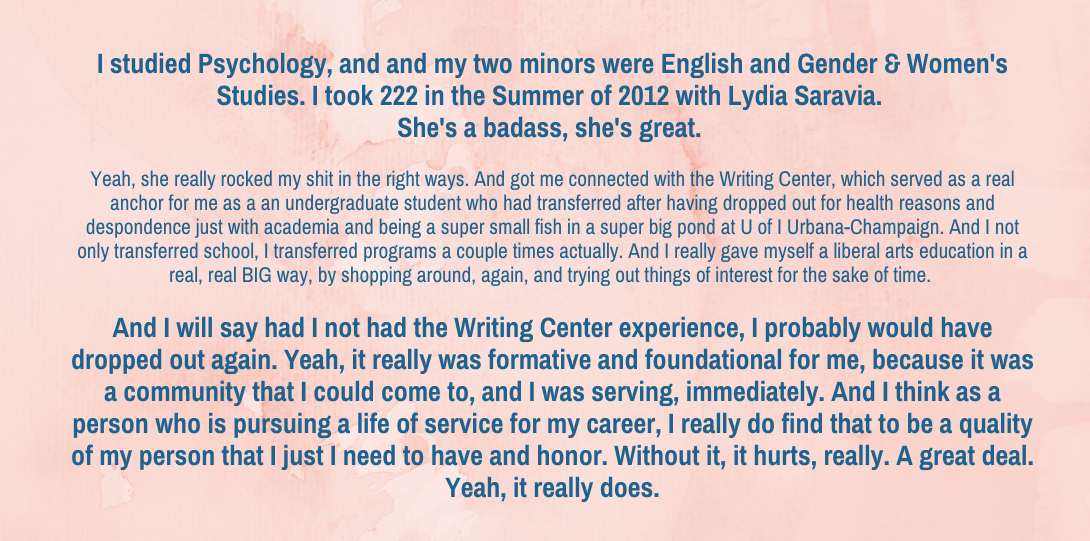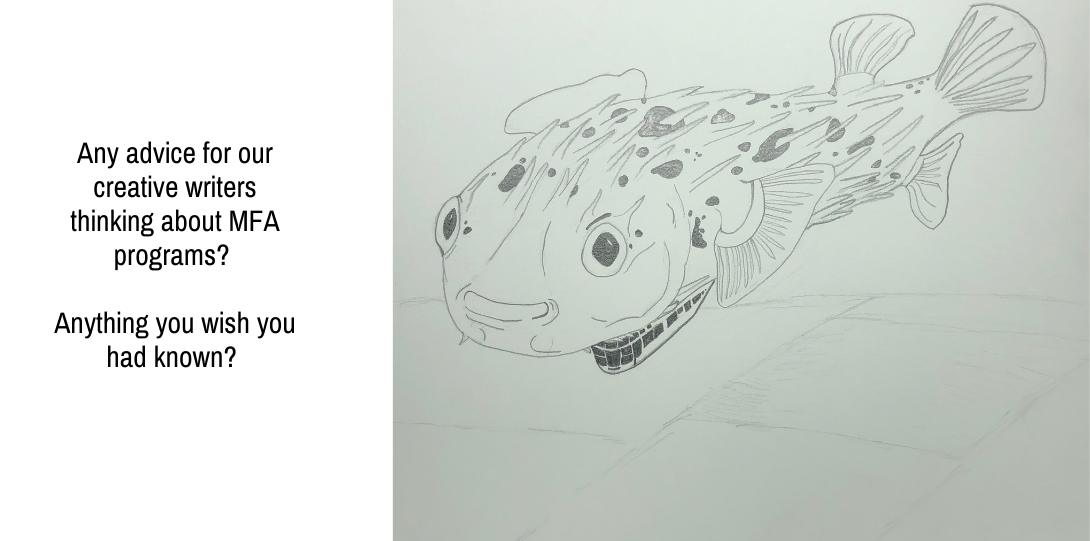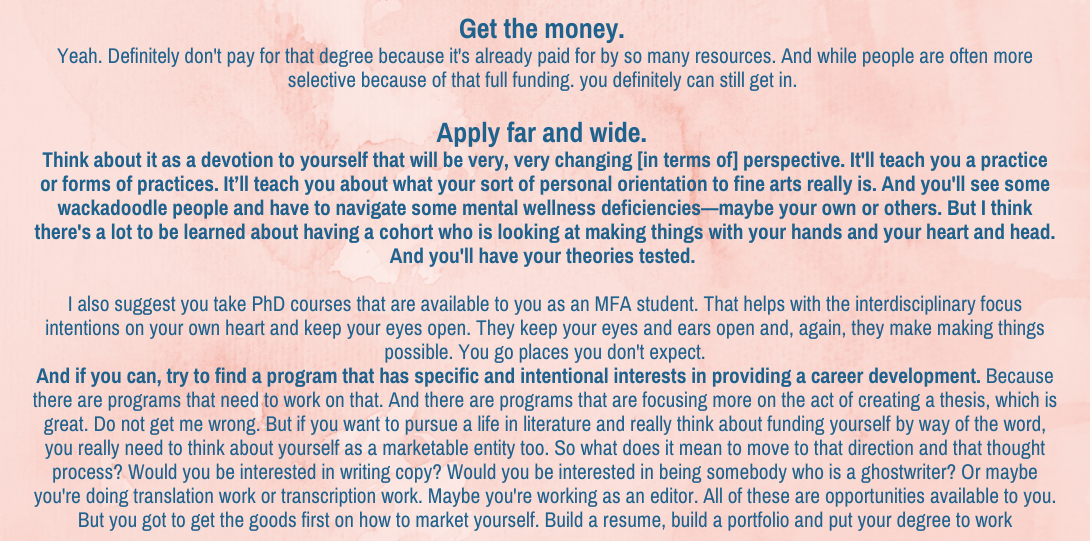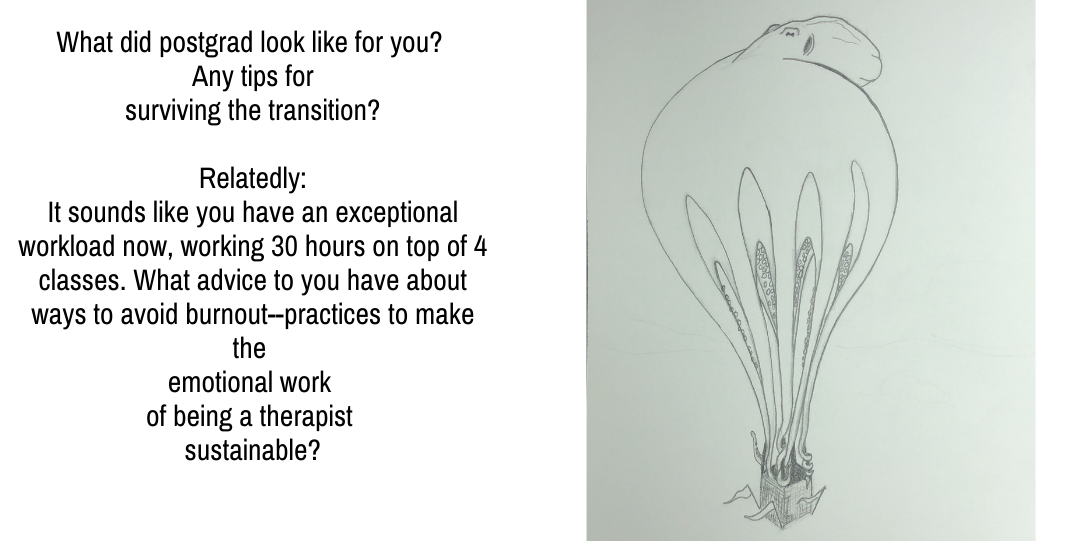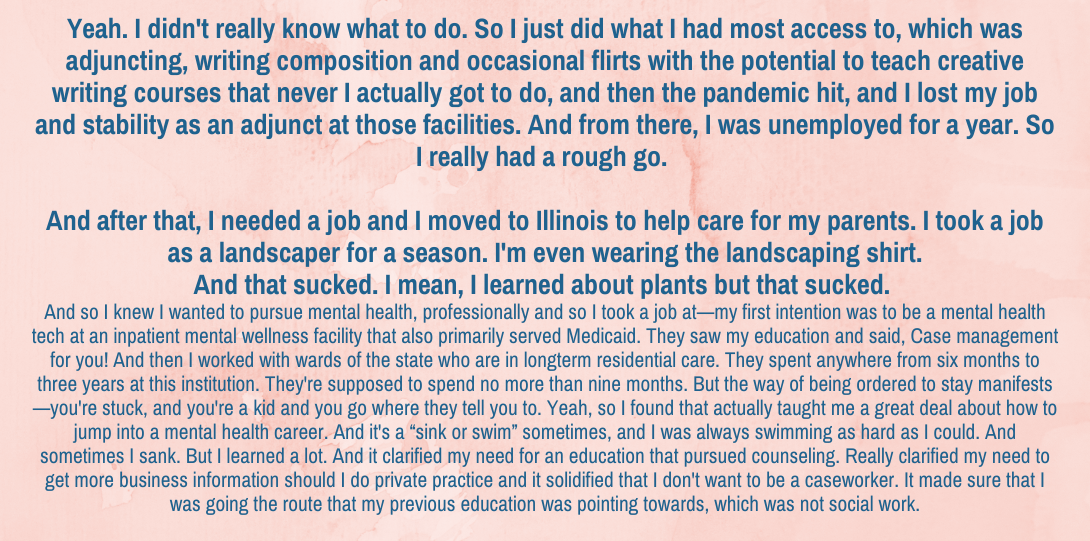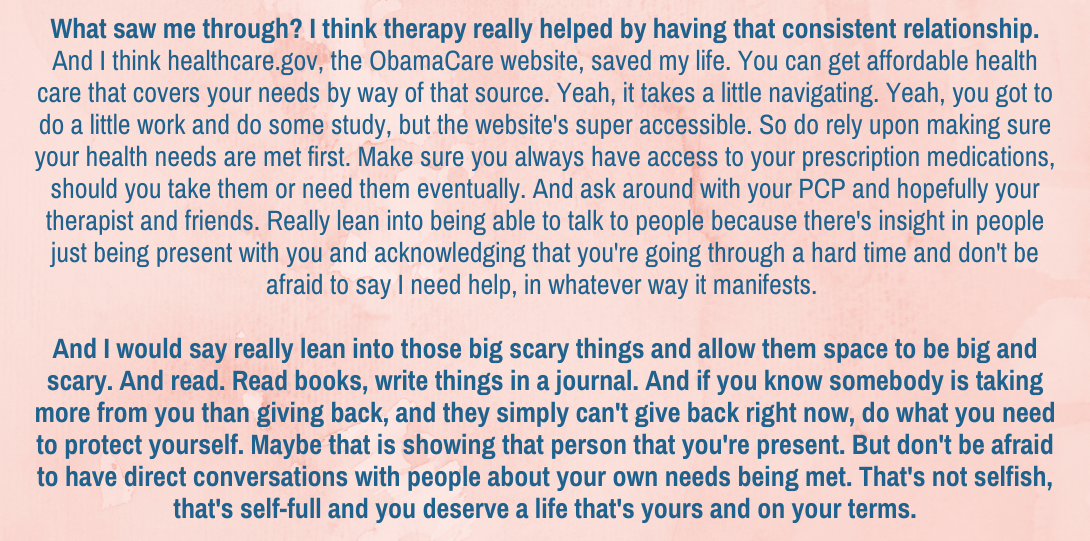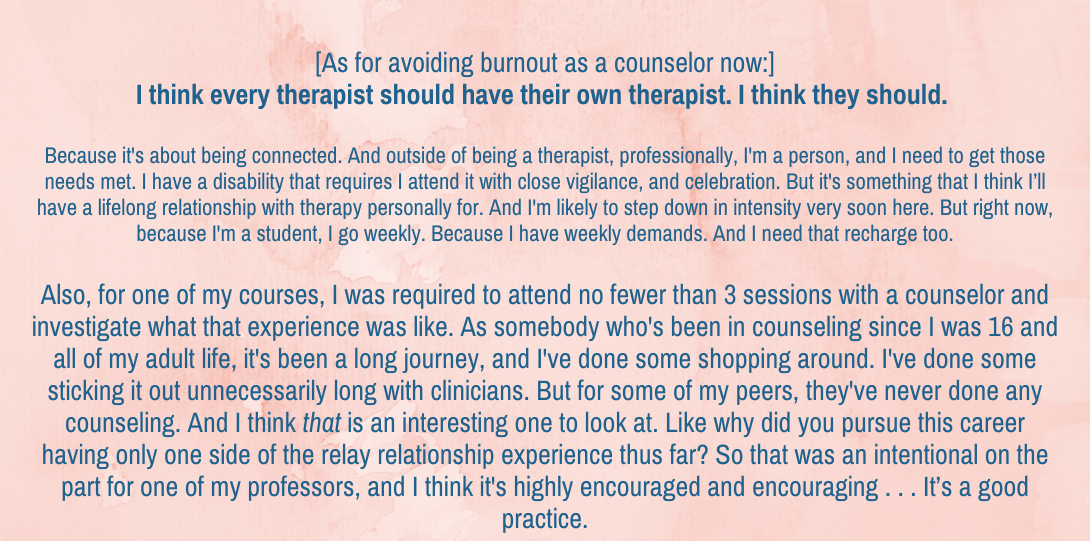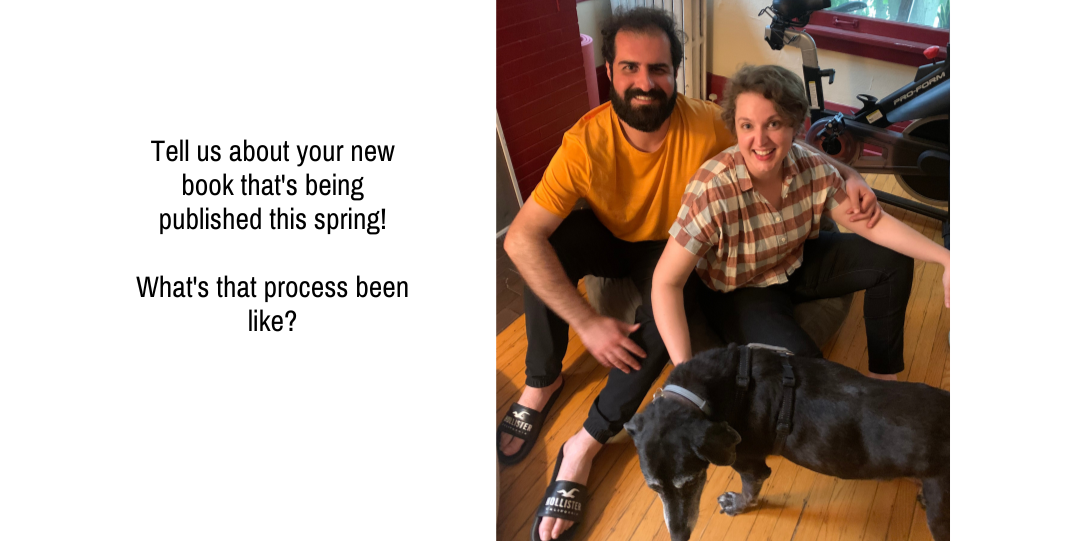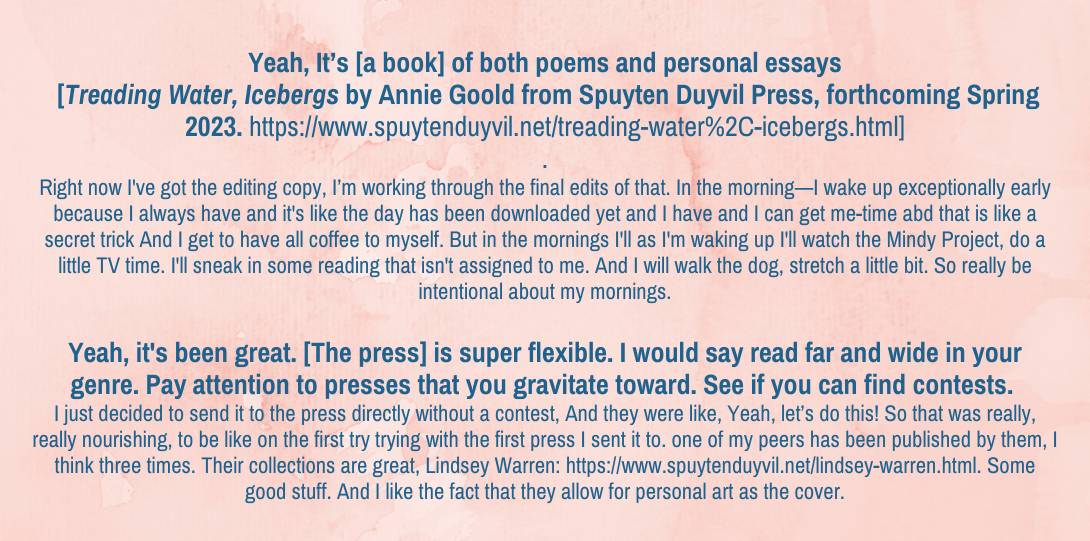Annie Goold, Writing Center Tutor Alumni Profile
1/22/23 Interview with UIC Writing Center Tutor ’14 alumna, Annie Goold Heading link
1/22/23 Interview with UIC Writing Center Tutor ‘14 alumna, Annie Goold
- Pronouns: She/her/hers
- Graduated: December 2014 with Major in Psychology, Minors in English and Gender and Women’s Studies.
- Took 222: with Lydia Saravia
- Tutored: all but 1 semester at Writing Center
- MFA in Poetry from Cornell, 2015-2017
- Currently: Earning MA in Clinical Mental Health Counseling Eastern Illinois University, expected graduation 2024
- first book of essays and poems, Treading Water, Icebergs, coming out this spring 2023 from Spuyten Duyvil!
Where are you and what are you doing these days for work these days?
I am doing a couple of things. I am currently doing a graduate assistantship in a substance use disorder rehab facility, which mostly serves people via Medicaid. We’re looking at the more economically stretched folks. There are sometimes folks who do voluntary admission and voluntary self-pay. But often we sign them up for Medicaid right then and there, given that many don’t even have health insurance whatsoever. So that’s my graduate assistantship. And I also am doing my practicum [for] which I have to do [a certain number of] certification hours of direct service at a Community Mental Health facility, about 30 minutes away.
What’s the graduate program you’re doing currently?
I am over at Eastern Illinois University studying Clinical Mental Health Counseling
It is in-person. And while sometimes there are synchronous Zoom classes occasionally to cover missing days or the momentary needs of the students, may there be hard issues or COVID or the professor needs a little help locationally, we very seldom do that. For the most part, it is all in person.
Would you tell people a bit about how you found this program and what is the kind of career path that you’re hoping it will take you toward?
So I initially started with the intention of getting another Master’s by way of solely online synchronous and asynchronous courses, and I sought out three different programs.
I can say that you really need to do your homework and really do your due diligence about what kind of studying you intend to do. Because while you can do an online program and feel successfully motivated . . . that really requires the kind of attention to asynchronous practice that may leave a person feeling a little lonely and a little distant, a great deal distant, from many peers—from a cohort. Yeah, so I initially started at the [a fully online private school] program, but having found it challenging to my own kind of educational needs and interests, I decided to transfer to Eastern, which is an all-in-person program. I can say it’s a little more intensive in some respects due to that. It is a two-year program, as opposed to a three-year program. And that can make a big difference on how one would choose to practice when it comes time to full-time student . . . adherence. And I will say, currently, I’m taking four classes. They’re either three to four credits a pop, and they have on top of that a minimum of 8-10 hours practicum a week. And with my GA I have to do a minimum of 18 hours as well to get full funding and a tuition waiver. So that means I’ve got 30 hours of work a week outside of classes. And I drive an hour one direction to get to campus so I’m tacking on a couple hours’ transportation at the same time.
I had no idea you were driving this much. Wow.
Yeah, thankfully I have a really great car1 And I maintain it like no other. Yeah. And I actually really appreciate the drive. It’s pretty direct, very easy. So I’m rocking out to Madonna’s “Like a Prayer.” And occasionally some classical. Beyonce’s most recent album is a masterpiece. It’s a devotion to 80’s and 90’s dance clubs, some dance hall influence, some just sort of New York cocaine scene. At the same time, it’s a really delicious devotion to just pop and disco, real big variation. Yeah.
And sounds like maybe the energizing jolt you need to get started on a 12-hour day or something like that.
Yeah, yeah, it’s true. It’s very true. I’ve been really intentional about my schedule. I can say that my first semester was harder in some respects. Maybe not as demanding of my hours, academically, and with my GA. But I didn’t—I sort of felt like I was starting the program out of breath at the start, mainly because I was a part time student at my former institution and I had a recent need for bereavement in my family. So I was just sort of in a mixture of transitions. Most of my peers are also probably in the range of 22 to 26. I am the second oldest in the course at 33 for my cohort, and so you feel the difference. But for the most part, there’s a lot of just interest in becoming an insightful person as well as a clinician. So whatever you do feel is sort of momentary, and very absorbable.
I came to Eastern by way of, partially, a personal connection. I had a friend who graduated from the program several years ago, prior to her PhD, and she’s now teaching, actually, at Adler University. Mostly the statistical courses, which I think is pretty rad. She also has her own private practice in specifically play therapy, which is also a really interesting and radical theoretical practice. There’s several different modalities and there’s several different theoretical approaches. Hers is person-centered or we say child-centered given the population served, and it really is pretty amazing what it means to attend to a person who’s younger, and whose main orientation and language in the world is play. So that was one of just several things that has opened my brain and heart and memory in a really righteous and playful way.
I know we have other tutors who might be interested in counseling but it can be expensive to do these programs. So what advice might you give people figuring out: How do I finance this? What’s going to make sense? How do I evaluate programs that are not always that forthcoming about what they’re offering and what they’re not?
So if you don’t want to have to fight to get a license immediately upon graduation, look for a CACREP [Council for the Accreditation of Counseling and Related Educational Programs] accredited institution. They have a great website that gives you the accreditation status of institutions state by state and by modality.
So [you can search for] part time, full time, [if you want to] know if there’s a master’s/PhD distinction, what type of counseling you’d like to pursue specifically for specialization, graduation rates—state-by-state they have all means of navigating and filtering for your needs.
And the university that I chose specifies between School Counseling and Clinical Mental Health Counseling. And from there, you get training on an individual basis. So I have currently taken Foundations and Basic Skills Counseling. a Statistics course that also taught me how to conduct research and write in a research way (kicked my ass). I’ve taken Play Therapy, which is unusual for starting off but I came in with some credits.
But I’ve already gotten up and running. And it’s been an excellent base upon which to build and challenge preconceptions. And so to really think about one’s orientation to counseling— so the school counselors also have the opportunity to take a specific licensing exam called the NCE which a lot of us take during our second year. But the school counselor track doesn’t require that you take the NCE. Clinical Mental Health Counseling does. So what the NCE provides is a specific license called an LPC, which is a licensed professional counseling degree. If one wishes to continue with advancements in both the financial and the educational sense and proper licensing, they can advance to becoming an LCPC, which is a Licensed Clinical Professional Counselor. And that takes about two years post-graduation, maybe three if you’re doing more part-time work. And it just sort of provides even more opportunities for you as you pursue counseling as a career.
And I would say, first and foremost, look for a CACREP-accredited institution. Then think about where you’re going to be physically. Are you somebody who thinks they can do an online modality? Are you somebody who’s thinks they need in-person primarily? And from there, think about maybe two- to five-year goals. Making a plan isn’t necessarily absolutely vital to deciding upon location, but it at least helps to begin the navigation process. And it never hurts to consider a flexible plan for one’s future after graduation from undergrad, and from Masters or even PhD should you wish to pursue a career that’s more about active service in the individual and group settings.
What would you say about options for financing these programs? I know you mentioned the current program you’re in did offer a GA-ship. Did Northwestern have that too and is it evident which schools offer that kind of option or not?
Yes, yes. Usually it’s a state school or a small liberal arts school that provide direct opportunities upon entry for a graduate assistantship, and usually that graduate assistantship entails a tuition waiver or some form of financial assistance that makes it possible for housing, the necessary materials for living, and I also am fortunate that my program has a book rental service as the primary means of getting textbooks. And so the fees that I do pay outside of my tuition waiver are, like, I think maybe $120, in comparison to what would be, per semester, easily over $1,000 in textbooks. So again, think about how the school will provide necessary materials, be they financial, primarily, or be they more secondary or tertiary concerns.
And most will also offer upon entry a scholarship. And so look for built in counselor-specific scholarships. Mine was an institutionally-specific counseling scholarship and that’s offered for both semesters my first year. It does change come next semester, because I will be continuing my GAship and I’ll be entering an internship year which is 40 hours a week, I will have fewer hours at my GAship but maintain my tuition waiver because it’s an external GA, but it still works primarily with the university.
And so if you’re seeking out a graduate assistantship, look first to be already built-in support that your school may have. Because ultimately I’ll be paying somewhere between $38-$40,000 for this degree entirely. That is [just my personal experience but it was] substantially less than a number of schools, primarily the online schools. So if you’re really looking for a bang for your buck . . . And for built-in extra-service experiences, because substance use disorder is one that I’m still studying but I’ve gotten more like direct hands-on experience with now, there’s a lot to be gleaned from the built-in opportunities that you get. So do your homework and be an advocate of yourself and really, if you can nail down like top three to five necessary things that you want upon entry to a school, follow those. Really do follow those.
And when you were looking at the private school online programs, did they offer GAships? Do you know if they offer that as an option for people or what you’re calling the built-in service experience options? By the way, what is a built-in service experience?
Good question. With all three of those, they did not offer GAships that I know of. There’s potential that they integrated that now, but because it was primarily an online program that I was seeking, that would make remote support that much more difficult for the university to actually initiate and fulfill. And so once I decided to go on ground, I really found a great deal more support financially and from the education just bases. Professor, peers, community—it’s all much easier because somebody’s already done the navigation work for you should you sort of find yourself less remote. And I think really the programs that bring out solid clinicians are ones that are on the ground, on campus. I am biased in that way. And I can’t necessarily say there are an extensive number of programs that aren’t very financially-friendly or experience-friendly. But from what I’ve seen it just seems like there’s just support from the on campus programs.
You said one of the nice things about your program is that it offers this substance abuse disorder extra-service experience. What does that mean? Does it mean the school itself runs a program that you can work within?
So mine is an external GA, which is different than an internal GA that may be working more primarily with direct but—how would I describe it?– more administrative kind of counseling or on-campus counseling. Being an external GA, I am technically a little bit more of an employee of that facility than I am an employee of the university.
So I do what I call “counseling lite” at the substance use facility, because I already have some experience teaching. I already have some experience working with large groups. The kind of role that others I’ve heard of who’ve gone through this program and have the GAship have had has been more of a client monitoring position. Which kind of looks less like counseling and more like clients’ physical safety needs being met. So my hours are less flexible than theirs because they can have night and weekend hours. I can have weekend hours, but it would be during the day. And as far as I know, night hours really are limited given the number of groups that are available during the day.
What’s the day-to-day work of being a counselor like? What populations are you working with? How long-term of a relationship do you make with your clients? What do you like about it? What are the challenges?
So this facility is really is devoted to substance use rehabilitation and thinking in terms of what is sustainable, both while inpatient, outpatient and eventually discharged entirely. So, the work I do primarily looks like group work, which is interesting because we’re thinking about interrelationships. We’re thinking about how to develop cohesiveness and we’re thinking about individual needs at the same time. Plus, this is a 28-day program. So the most I’ve seen a person spend time at the facility doing inpatient, specifically, is about 35 days. Sometimes you can get extended to 45, but it’s dependent on the insurance. And insurance does not like to pay for inpatient for any longer than 28 to 32 days. Again, depending on the insurance you get.
And so when I’m working with clients directly, I’m really putting to use both the basic skills that I attained in more individual practice, and I’m currently Group Counseling right now as a class. So I’m really getting a super extensive hands-on experience for thinking about grief group counseling, which involves psychoeducation. But I find I’m definitely running most often the women’s therapy group. So I am working primarily with women. Although we are an integrated program. There are women and men-specific groups every day. So they’re in groups from 8:30am to 8:30 pm every day, including weekends. And so the groups that I lead tend to be women-specific. I, being somewhat still a great deal a novice, am mostly doing what’s called “emotional regulation.” So I’m helping in the sense of letting the clients guide the need of the day [?] and develop interpersonal relationships. And think about intrapersonal relationships, primarily. And Dr. Yalom, he’s kind of like the head honcho of what group counseling means as a specific therapeutic practice compared to individual [counseling]. And the kind of therapeutic experience one can have with a group can be just as monumental as individual [experience]—sometimes more.
You have group acceptance or challenge or caring confrontation, and real investigation of oneself while in the group. And thinking of the group as an entity as much as a series of individuals gathering. So I try to emphasize that in the group, in that way nobody really monopolizes the time, although sometimes we do devote a little extra support to people who clearly are in need of it for that particular setting. In other cases, we provide homework that looks more into both CBT and DBT.
CBT is cognitive behavioral therapy. That’s the one that really is looking at skillfulness and homework. And DBT is Dialectical Behavioral Therapy, which is incorporating mindfulness components. So we think in terms of ration mind, emotion mind and the integration of those two we call “wise mind.” So, again, that does somewhat have homework, but for the most part, my work is emotional regulation. Occasionally, I will also run a 12 Steps group. So we do follow AA and NA in somewhat of a looser bent by being women-specific or men-specific. And in that way, we see an integration of further outside supports, and just getting familiar with what it means to have a kind of advancing practice that one can take with them in times of both need and celebration.
What would you say are your favorite parts of this work and what do you find challenging? One question on top of that might be does this work feel sustainable? I know you worked at a time at a longterm residential program for adolescent wards of the state where there was very high turnover because of understaffing. So I’m curious, in your current work—what are your favorite parts, what are the challenges, and can you imagine this being sustainable work?
Great question as well. So a lot of counseling is distinguished by the institution in which it’s practiced. So there’s direct inpatient residential, which is the most intensive care.
Then there are partial-hospitalization programs, which are also usually somewhat residential, sometimes not.
And then there’s community mental health centers, which usually work in tandem with local psychiatric hospitals or psychiatric units that are nearby, depending upon specific need.
And then there’s private practice.
And so with each sort of tier, your endurance is different. And it’s also very specific to the person that’s practiced it. So residential: intensive work. I’d say it’s very intense. And given just the challenges of what insurance is willing to pay for with residential, I find there’s a great deal of underservice just based on the limited time that people can spend on a psychiatric unit.
And there’s a lot to be said about community mental health centers as well. They see more Medicaid-based clients. And there’s often a sort of sliding scale if they’re doing a direct person pay, outside of insurance.
And then with private practice, it also is pretty dependent upon the insurance you have, and the individuals inside private practice, whether or not they’re willing to accept certain types of insurance beyond Medicaid and beyond the sliding scale.
So both of the facilities I currently work at are Medicaid primarily. And I’m seeing more variety of psychiatric challenge at the community mental health center. The women that I work with at the substance use rehabilitation center—I’m seeing a lot of domestic violence. I’m seeing a lot of exceptional, complex trauma. With that, a lot of PTSD symptoms, a lot of dissociative symptoms, an extraordinary amount of depression, anxiety, and real challenges with what it means to combine the name “woman” and “addict” and potentially “mother” and “addict.”
[In] society, [“mother”] is not often the go-to image that a person thinks of as one who is addicted to substance or dealing with some form of addictive behavior. And that’s a real problem that we face regularly. And with these compounding issues, sometimes we refer clients to “dual diagnosis” institutions. They are able to get their needs met in a more complex way. But again, insurance [coverage] is sort of dependent upon a person’s passion to get into those spaces. And there’s also the issue of willingness. Some people are—a lot of people actually at the substance [abuse clinic]—are involuntary intakes, usually court-ordered or ordered by way of DCFS, to maintain some form of drug court rehabilitation and probation and to maintain certain types of access to their children. With the community mental health center there’s less involuntary and a much wider range of age. So currently the five or six clients that I have are individuals aged between eight and fifty-two. So I’m getting a whole lot of different experiences. And with that, I can practice different types of modalities, different types of theoretical approaches, and it gives me experience with new populations that I haven’t had a chance to work with. That doesn’t mean my substance use counseling hasn’t been effective in application there because as we know it, when it’s pernicious and pretty much everywhere and often a comorbid issue, but I would say my types of endurance vary and are getting pushed differently at each place.
So since I’ve had four months’ experience now at the substance use counseling facility, I have been able to build in some more structured personal scripts, but it also comes with an in-built curriculum. The facility already has a curriculum which I follow. So although the emotional regulation kind of practice I do is pretty much vamping. it does have a direct curriculum which I built and integrated into my own sort of education script.
With the community mental health space, because I’m looking at a variety of wider varieties of diagnoses and disorders. that means I’m getting pushed to really investigate what population I most want to. So I am finding myself really interested in women’s issues. I’m very interested in psychotic disorders. And I am finding myself more interested as well in older populations. So while I definitely feel I have interest in younger pups, I’m getting more and more interested in what it would mean to counsel people who are substantially different than myself, often two to three decades older myself, and see what growth for a person who’s in their 60s, 70s, maybe even 80’s, could look like, and how that kind of age presents a need.
So, right now a lot of the work I’m doing in the community mental health center, ranges from adjustment disorders with children and adolescentsWe see a lot of trauma-based interests. We also see some conduct disorder. Mostly it’s adjustment disorders. And life skills building. So it’s. . . helping me to think about what specializations I’d like to do in community mental health centers and a potential private practice. I will say a goal of mine is after maybe 10 years of practice in someone else’s community center in a more public space or a more private practice space, I’d like to open up my own private practice. But I know that requires a great deal of business acumen I simply don’t have yet. I’ll take my time and really come to know how I practice and come to a mastery point. And there’s also consulting which makes bank and is something that I think after about 5-10 years practice in the community I would feel comfortable pursuing to augment any kind of individual practices.
So my favorite part is just seeing what the day needs and really thinking about strengths-based approaches primarily. So in that way acknowledging what people are already doing, thinking about the tools that are of service, already being used. Sometimes those tools are maladaptive, but all tools serve some purpose. And once we investigate that, it makes us think about what sort of catharsis is necessary, and then some sort of change in direct intentional practice to really get to a place that’s confidently closer to one’s ideal self.
In the community mental health clinic, do you feel like people have the ability to work long enough with you to begin to make changes? Because it seems like it’s a little dependent on how much Medicaid wants to subsidize it? I know it’s an issue with lots of insurance that they’ll pay for a handful of sessions, but it’s rarely sufficient. And then after that, you’re sent to the private market and good luck. So I wonder, how long can people see you in therapy before insurance boots them out? You know what I mean?
Right, totally. So, with community mental health centers, there’s often a lot more flexibility on the part of insurance. So we’ll see often more people are capable of having 28 sessions—whether or not that happens weekly, multiple times a week, biweekly, or month to month depends on the need. And on somewhat the decision of the client and also the decision of the therapist and their availability. So usually with private insurance because you can just work forever? And there’s something to be said about working with somebody in a more extensive manner. I think with substance use counseling, it should be a minimum of three to six months of inpatient service, which we see more often for folks who are dealing with things like eating disorders. But that’s a bias within the community as well.
Nonetheless, the community mental health center will provide me a LOT longer time to work with a patient or a client on what they’re interested in working on or what their needs present. So what kind of caring confrontations I would need to look up and need to structure into a session alongside the built-in interest of the client. So, one of my clients that I have right now has been working with my supervisor, and I’ll be working in an observational way with her. She’s been with that supervisor for 10 years. So what I’m doing is serving as an example for this particular person—- providing an opportunity for this person to transition, really, to another person. Because it may be the case that they’ve plateaued; it may be the case that their needs aren’t being met in the same way. . . I’ve only had one session with her but I’m really looking forward to seeing what she’s intending to do with her own future and how she wants to live her life.
That’s heartening to hear that you don’t feel overly constrained by the time limit set by the insurance company. There have been stories in Chicago of the closures of community mental health clinics and there being waitlists for people to get in as a result. Does your CMHC have a long waitlist? How do you manage that?
Yeah, that’s a really good question. Currently, I don’t know how long people have been on the waitlist, but we do have a waitlist. Usually it’s for adolescents first and foremost, which is interesting. I’m not sure why that is but I’d love to investigate more. And you’re totally right—to [see a psychiatrist at community mental health centers can be] a two years’ waitlist. . .
That’s what I’m finding a lot, is trying to get students in to see a psychiatrist who could do any prescription work— they might get into a psychiatric nurse if they’re lucky, or maybe a counselor, but if the counselor believes they might need medicine, it can be a long haul.
Yeah, often the interest is to get them with a nurse practitioner, psychiatric nurse practitioner, if the psychiatrist isn’t available. And another level is also your PCP. But those sorts of needs are very extreme. They’re really extreme. And given the pandemic and this societal trauma we’ve all gone through, and continue to experience, we’re only seeing more and more demand for physicians, [and longer] waitlists.
So it’s definitely a career for which a person has MANY career opportunities. Many, many spaces in which they could be hired. And we’ll probably see an uptick in actual salary, or hourly pay, just because of this nature of need. But it does come with its own need for [mental health workers] to be protective of their self-care . . So how they make themselves accessible to clients—one needs to always be on the lookout for compassion fatigue.
And one needs to think about what their interest is finding employment. So if there’s ever a need to dip down in hours, how do you manage that financially? How do you negotiate with your supervisor? And given that we spend the majority of our days with our coworkers, think about your satisfaction with who you are spending time with, both inside session and in your work with other counselors. Because if you’re not satisfied, get out. There’s actually another spot. And you can get your needs met just as much as your clients. And they can’t get their needs met if you’re not taking care of yourself.
So I treat self care much more seriously than I did last semester! Again, that kind out-of-breath feeling led me to feel like I was falling forward for a long time. But now that I treat self-care with a lot more intention, and schedule it in my days, and think in terms of being gentle and kind to myself makes it way more helpful and way more universally helpful. Like I’m cleaning up after myself at home a lot more. I’m spending time with my partner in a really purposeful way and we’ve grown closer because of it. And I am able to focus on homework better. I’m able to just sort of delegate time accordingly and be protective of myself as need be.
It sounds like you have an exceptional workload now. So I imagine that’s all the more important when you’re working 30 hours on top of 4 classes.And it sounds like you find the work rewarding but I imagine do your find yourself feeling what you’re calling compassion fatigue or does it give you enough back that you feel like at the you can kind of recharge yourself each day? The placement you were in with adolescents was a really different scenario. Do you mind describing that a little bit as a counterpoint just so people can understand sort of the variety of spaces they might find themselves in in this career and what might suit them better?
Sure. So technically, my position at that former place was a social work position as opposed to a counseling position. So that meant I was [talking] with agencies a great deal more, advocating for clients outside in-session moments, and just trying to navigate for resources like no other. And I found that to be administratively exhausting. Working with the clients? Not a problem. I get energy from working with clients and thinking in terms of being somewhat of a detective, somewhat of a cheerleader, someone who is just present. It’s huge in the sense that this profession is about witness more than anything. Showing people that they are seeing and that they are seen and are valued in therapy. And I find that to be so nourishing.
The more administrative and case management stuff? That’s more challenging for me. Because time. I would always—and this will probably be a thing that I’ll have to negotiate a lot with in my future career—I will always serve the client first, and give them what time I may have set out initially for case management for crisis management. And I know I will have to be more rigid with that. And I’m already starting to structure in that rigidity. But it’s only by way of that structure that I can really operate on all those levels.
Plus, I think as a therapist should have their own therapist. I think they should. Because it’s about being connected. And outside of being a therapist, professionally, I’m a person, and I need to get those needs met. I have a disability that requires I attend it with close vigilance, and celebration. But it’s something that I think I’ll have a lifelong relationship with therapy personally for. And I’m likely to step down in intensity very soon here. But right now, because I’m a student, I go weekly. Because I have weekly demands. And I need that recharge too.
That’s really great to hear. Does your program offer that service to you? Or are you finding it outside through your own insurance, that kind of thing?
The student insurance does provide access to counseling, both on campus and off. I, also, for one of my courses, was required to attend no fewer than three sessions with a counselor and investigate what that experience was like. As somebody who’s been in counseling since I was 16 and all of my adult life, it’s been a long journey, and I’ve done some shopping around. I’ve done some sticking it out unnecessarily long (and necessarily long) with clinicians who I may not have been completely ready. But for some of my peers, they’ve never done any counseling. And I think that is an interesting one to look at. Like why did you pursue this career having only one side of the relay relationship experience thus far? So that was an intentional part for one of my professors, and I think it’s highly encouraged and encouraging to hear that people are continuing that relationship or shopping around, having found that relationship not a fit. It’s a good practice.
That seems like a wise thing for your professor. Like, this isn’t an us versus them thing. This is a human thing. Like, if you think this is valuable for others, you should do it too. And it reminds me a little bit of how we talk to tutors. The first thing we say is, Get tutored—you should experience this as a writer. And if you haven’t, that’s a shortcoming we need to fix.
I’m curious in that regard because I know you’re someone who’s taught before. And you talk about curriculum with substance abuse counseling. How is this like teaching and in what ways does your experience as a teacher transfer and your training at the Writing Center transfer into the work you’re doing now? Do you see any parallels, particularly for our tutors who are currently in that WC role and want to understand how this [tutoring skill] might be portable?
For sure. I think as somebody who has both taught and tutored what I have been able to take away from both experiences is that we all have narratives. And we all have a direct experience. And that perspective can be skewed towards certain directions, maybe intentionally or unintentionally. But what sort of narrative we have of ourselves can be adjusted. And I think as a tutor, I learned that on a sort of minutiae level, with tweezers, thinking about phrases, thinking about construction of sentences, as it is needed in a paragraph or as it is needed in an overall academic conversation. Whereas as a teacher, I may have had intentions for each day, but I had to be flexible with how a curriculum was applied. I definitely got all the goals met on the part of the academic necessities. But I know there’s always an opportunity to come back to a conversation that may have been stymied by time, by readiness to have it integrated into a class or a tutoring session. And [teaching] also taught me about thinking about the entity that is a group at large and thinking about its needs as much as individual’s needs and progress. So it made me think about micro and macro, both tutoring and teaching.
And now as a forthcoming clinician, I’m getting to have the conversations that I wasn’t in the right room for before. And those were the conversations that I think I was most drawn to from the very start. And I knew that my education that I’d had with my undergrad I wanted to continue. Granted, I pursued an MFA first. But that, I think, applies just as much to counseling now and makes a lot of sense, journey-wise, if you’re really considering narrative, if we’re really considering the minutiae and necessity of specific words and emphases and subtexts that people have about the world.
Really interesting. So this leads nicely to another question. Would you tell people about what you studied in undergrad and your other degrees since then, such as the MFA?
I studied Psychology, and my two minors were English and Gender and Women’s Studies. I took 222 with Lydia Saravia. She’s a badass, she’s great. Yeah, she really rocked my shit in the right ways. And got me connected with the Writing Center, which served as a real anchor for me as an undergraduate student who had transferred after having dropped out for health reasons and despondence just with academia and being a super small fish in a super big pond at U of I Urbana-Champaign. And I not only transferred school, I transferred programs a couple times actually. And I really gave myself a liberal arts education in a real, real BIG way, by shopping around, again, and trying out things of interest for the sake of time.
And I will say had I not had the Writing Center experience, I probably would have dropped out again. Yeah, it really was formative and foundational for me, because it was a community that I could come to, and I was serving, immediately. And I think as a person who is pursuing a life of service for my career, I really do find that to be a quality of my person that I just need to have and honor. Without it, it hurts, really. A great deal. Yeah, it really does.
I feel like you have this kind of special kind of mind, Annie, where you are both someone who is so deeply a compassionate person and such a helping person. And yet, you also have this rare creative gift with language and frankly other media too. And I imagine that bounty of different skills and capacities means choosing a major is not simple. I feel like there’s other tutors I see who also struggle figuring out, how do I major in something without forfeiting part of myself, and how do I balance the various parts of me I want to develop while I’m checking all the boxes of a degree?
For you, it seems like you found a way to do that by having a major and then a couple minors. Is there any advice you would give people who are having a similar struggle, where they’re like, I really am drawn to language and creativity, and I want to maybe study English or Art or something like that. But I also think I might be interested in being a counselor. Do I have to be a Psych major? How would you suggest people think about this, having both interests?
So . . . I gave myself a lot of time. And I think I really benefited from being loose about things, instead of going too fast or going immediately into a direction that I always had apprehension about, or knew was going to be scary. I went for things that I was interested in, that I didn’t know anything about or that I had preconceptions about that turned out to be extraordinarily wrong. And that I got a new perspectives from and people to speak with and people to speak about,
As far as a counseling degree—you don’t have to start with Psych. You don’t. I have a peer who’s coming in from being an educator for five years. I have another here who’s coming in from physical therapy as their undergraduate degree. And I have another one who was a journalism major. And so we got this huge variety of folks who have so many different experiences, but that doesn’t mean they are subtracting from their potential career. And so for those who are also experiencing sort of conflicting talents and passions and interests, I’d say you’re not neglecting those other things that you’re capable of doing by looking at something a little bit longer. If anything, it kind of works like—if you were to think about a piece of fabric, think about pinching it in the center and pulling it up. Yes, there is a focal point, there’s a center, but [everything else is going on too]. So in that way, I think about various capacities and points of focus. Eventually, there will be other points of focus, but everything comes up. Everything comes up. You learn how to be interdisciplinary in that way. And I think you can really craft a future on your own terms inside and outside of academia by thinking about it in that way.
Do you want to speak at all about your experience with your MFA program—any advice to people thinking about that, as creative writers? Anything you wish you had known?
Get the money.
Yeah. Definitely don’t pay for that degree because it’s already paid for by so many resources. And while people are often more selective because of that full funding. you definitely can still get in.
Apply far and wide.
Think about it as a devotion to yourself that will be very, very changing [in terms of] perspective. It’ll teach you a practice or forms of practices. It’ll teach you about what your sort of personal orientation to fine arts really is.
And you’ll see some wackadoodle people and have to navigate some mental wellness deficiencies—maybe your own or others. But I think there’s a lot to be learned about having a cohort who is looking at making things with your hands and your heart and head. And you’ll have your theories tested.
I also suggest you take PhD courses that are available to you as an MFA student. That helps with the interdisciplinary focus intentions on your own heart and keep your eyes open. They keep your eyes and ears open and, again, they make things possible. You go places you don’t expect.
And if you can, try to find a program that has specific and intentional interests in providing a career development. Because there are programs that need to work on that. And there are programs that are focusing more on the act of creating a thesis, which is great. Do not get me wrong. But if you want to pursue a life in literature and really think about funding yourself by way of the word, you really need to think about yourself as a marketable entity too. So what does it mean to move to that direction and that thought process? Would you be interested in writing copy? Would you be interested in being somebody who is a ghostwriter? Or maybe you’re doing translation work or transcription work. Maybe you’re working as an editor. All of these are opportunities available to you. But you got to get the goods first on how to market yourself. Build a resume, build a portfolio and put your degree to work.
That is really helpful. Will you tell people where you did your MFA and what was the timeframe for that? Just so I get your degrees correct. You did an MFA in poetry at Cornell. .
From 2015 to 2017. And then I was a lecturer from 2016 to 2019 at Cornell.
Then did you go on to be a lecturer elsewhere from there?
Yeah, I was an adjunct at three community colleges in Washington State.
Okay. I recall that!
What at a time!
You were doing many other jobs. I think this maybe is the general question I have about sort of post grad survival skills. Like, what did your post grad life look like? What were challenges and how did you find ways to survive them and meet them whether those are financial or personal or family. Surviving that post-grad transition, but what did that look like for you?
Yeah. I didn’t really know what to do. So I just did what I had most access to, which was adjuncting, writing composition and occasional flirts with the potential to teach creative writing courses that never I actually got to do, and then the pandemic hit, and I lost my job and stability as an adjunct at those facilities. And from there, I was unemployed for a year. So I really had a rough go.
And after that, I needed a job and I moved to Illinois to help care for my parents. I took a job as a landscaper for a season. I’m even wearing the landscaping shirt.
And that sucked. I mean, I learned about plants but that sucked. And so I knew I wanted to pursue mental health, professionally and so I took a job at—my first intention was to be a mental health tech at an inpatient mental wellness facility that also primarily served Medicaid. They saw my education and said, Case management for you! And then I worked with wards of the state who are in longterm residential care. They spent anywhere from six months to three years at this institution. They’re supposed to spend no more than nine months. But the way of being ordered to stay manifests—you’re stuck, and you’re a kid and you go where they tell you to. Yeah, so I found that actually taught me a great deal about how to jump into a mental health career. And it’s a “sink or swim” sometimes, and I was always swimming as hard as I could. And sometimes I sank. But I learned a lot. And it clarified my need for an education that pursued counseling. Really clarified my need to get more business information should I do private practice and it solidified that I don’t want to be a caseworker. It made sure that I was going the route that my previous education was pointing towards, which was not social work.
And that then took you to [the online-only private school program]. And then you moved to Eastern Illinois University.
Yeah. I bounced around.
Any tips you would give to tutors who are also struggling with periods of unemployment and periods of being called on to care for family and trying to keep afloat when times are really hard and you’re not getting your basic needs met? I know you were incredibly strong and resilient through all this and you had to be the life support to others. I feel like you’ve learned a lot and grown very wise from this. You survived this and really came through stronger I think. So I am keen for whatever tips you might want to share. What saw you through?
Yeah, what saw me through? I think therapy really helped by having a consistent relationship that I was going through. And I think healthcare.gov, the ObamaCare website, saved my life. You can get affordable health care that covers your needs by way of that source. Yeah, it takes a little navigating. Yeah, you got to do a little work and do some study, but the website’s super accessible. So do rely upon making sure your health needs are met first. Make sure you always have access to your prescription medications, should you take them or need them eventually. And ask around with your PCP and hopefully your therapist and friends. Really lean into being able to talk to people because there’s insight in people just being present with you and acknowledging that you’re going through a hard time and don’t be afraid to say I need help, in whatever way it manifests.
And I would say really lean into those big scary things and allow them space to be big and scary. And read. Read books, write things in a journal. And if you know somebody is taking more from you than giving back, and they simply can’t give back right now, do what you need to protect yourself. Maybe that is showing that person that you’re present. But don’t be afraid to have direct conversations with people about your own needs being met. That’s not selfish, that’s self-full and you deserve a life that’s yours and on your terms.
So I know that’s a little bit amorphous. But if you’re really hurting for employment, there is no shame in a temp agency. Do your homework on those because some are not going to serve you as well as others.
If you are moving back with family or moving to space to start a family or live with family or whatever, it’s not a failure. It may be a different stride than you were expecting. And yeah, you may feel resentment. And that’s okay. Give it space too. Acknowledge where that is coming from and listen to it because it is also wise. But there are tools that you can gather, and a big way to do it is just keep talking. Just keep talking.
What is bringing you joy these days? What is fun for you? I have to just put in, Annie, you do everything. You don’t just do everything, you’re kind of brilliant at everything. Like you knit, you bake, you draw, you paint, you sing, you are musical, you write poetry, you’ve published a book. Tell us about the book you published?
Yeah, right now I’ve got the editing copy, I’m working through the final edits of that. In the morning—I wake up exceptionally early because I always have and it’s like the day has been downloaded yet and I have and I can get me-time and that is like a secret trick And I get to have all coffee to myself. But in the mornings I’ll as I’m waking up I’ll watch the Mindy Project, do a little TV time. I’ll sneak in some reading that isn’t assigned to me. And I will walk the dog, stretch a little bit. So really be intentional about my mornings.
Is Eleanor with you?
Eleanor is with me! Let me see if I can bring her.
How old is Eleanor now?
Has she still got the boisterousness?
Yeah, she doesn’t jump up on things because we’ve got a bit of arthritis. But she has several very plush beds throughout the place that are hers alone.
With your book, will you be doing readings?
There are a couple local bookstores I’ve talked to and they’re like, Yeah, let’s do it. So there’s that. If I can jump up to Chicago for a little bit and see what’s up in my town where I go to school.
When is it due to be released? Can people buy it?
Not quite yet. It should pretty shortly. It’s a little dependent on me getting edits done.
Would you want to say anything about the process of working with the press—has it been a good experience for you?
Yeah, it’s been great. They are super flexible. I would say read far and wide in your genre. Pay attention to presses that you gravitate toward. See if you can find contests. I just decided to send it to the press directly without a contest, And they were like, Yeah, let’s do this! So that was really, really nourishing, to be like on the first try trying with the first press I sent it to.
Was this just a press you had admired for some of their other publications?
Yes, I did. And one of my peers has been published by them, I think three times. Their collections are great, Lindsey Warren. Some good stuff. And I like the fact that they allow for personal art as the cover.
Can I see the cover? Did you draw the artwork?
Yeah, I’m not satisfied with this one yet. Yeah, technically, it’s this image but a little bit more graphically [blackened]. This was all Photoshop. Yeah, I just traced the outlines of tree limbs of an image I really loved, and then complete the image out of interest of being incomplete and thinking about how very different shapes exist kind of organically.
Do you have art inside the book as well?
It’s variation of both poems and personal essays, so that way, I did not draw anything but I think I’m drawn to the [form].
